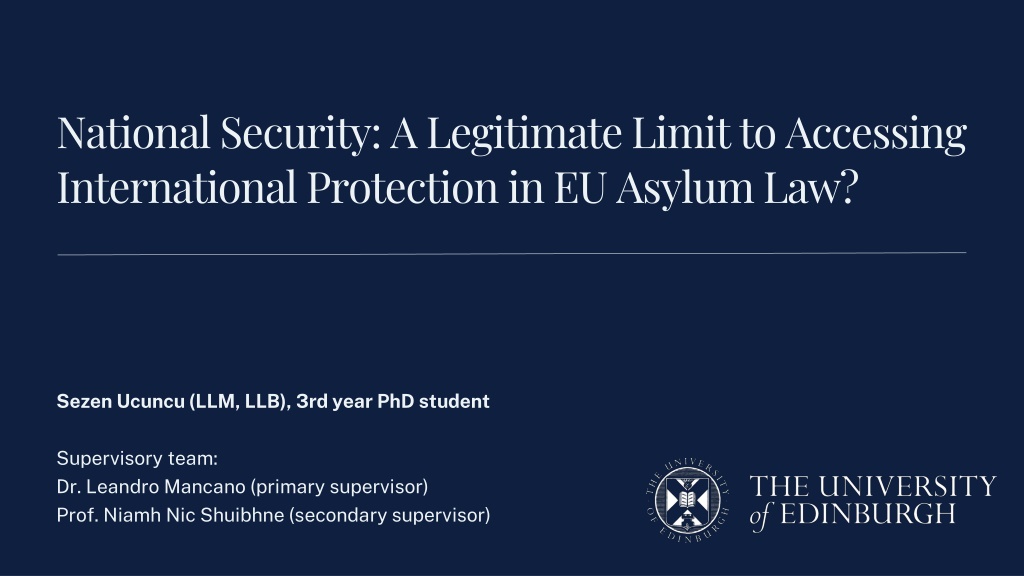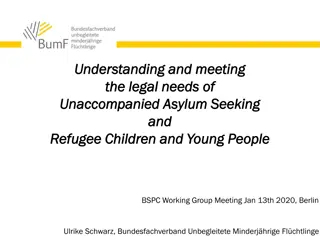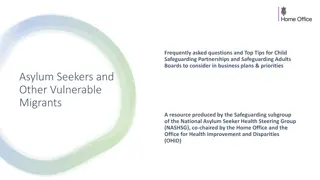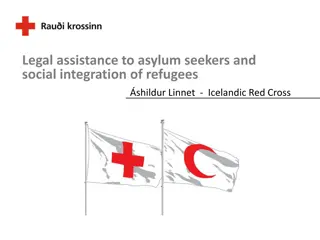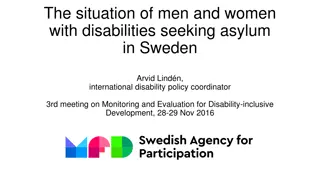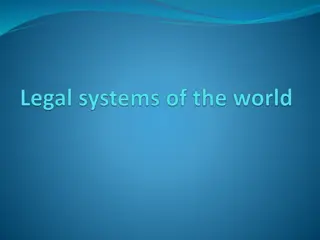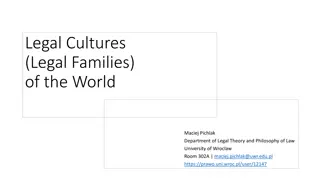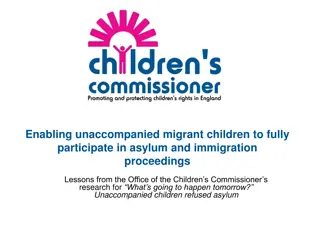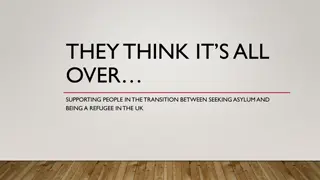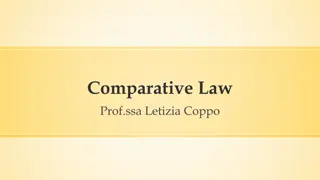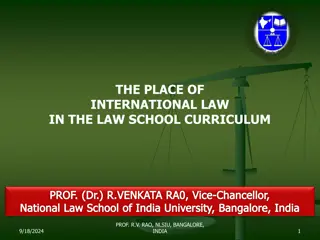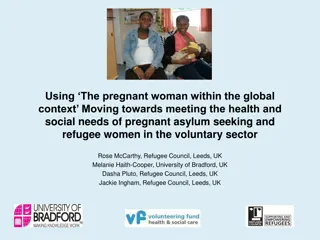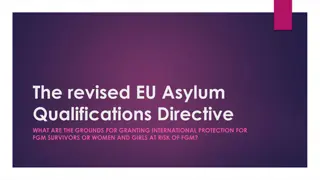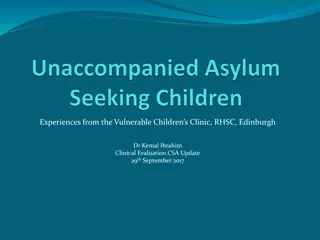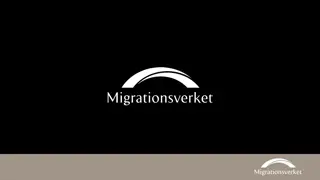Safeguarding National Security in EU Asylum Law: A Legal Analysis
The recast Qualification Directive allows Member States in the EU to restrict access to international protection on security grounds, including safeguarding national security. This article explores the limits imposed by national security concerns on accessing international protection in EU countries, focusing on the example of Ireland. The Irish International Protection Act grants the Minister of Justice significant authority to control asylum and migration for security reasons, highlighting the balance between state functions and individual rights in the asylum context.
Download Presentation

Please find below an Image/Link to download the presentation.
The content on the website is provided AS IS for your information and personal use only. It may not be sold, licensed, or shared on other websites without obtaining consent from the author. Download presentation by click this link. If you encounter any issues during the download, it is possible that the publisher has removed the file from their server.
E N D
Presentation Transcript
National Security: A Legitimate Limit to Accessing International Protection in EU Asylum Law? Sezen Ucuncu (LLM, LLB), 3rd year PhD student Supervisory team: Dr. Leandro Mancano (primary supervisor) Prof. Niamh Nic Shuibhne (secondary supervisor)
C O N T E X T The (recast) Qualification Directive allows Member States to limit access to international protection on certain security grounds, including safeguarding national security. An applicant s or beneficiary s access to international protection may be restricted if they threaten the national security of the EU Member State in which they have taken refuge, and measures taken in this context may lead to a person s exclusion from or withdrawal of international protection status or even prevent the person from benefitting from the non-refoulement principle. The concept of safeguarding national security is also referred to as an essential State function in Article 4(2) of the Treaty on the European Union (TEU), along with some other elements (namely national identity and equality of Member States). Although the contexts in which these concepts are employed are different, some Member States have advanced the argument of safeguarding essential State functions in limiting access to international protection on security grounds.
I R E L A N D : A N O TA B L E E X A M P L E Irish International Protection Act (giving effect to Council Directive 2004/83/E.C. under Protocol No. 21 annexed to the Treaty on the Functioning of the European Union) provides grounds for limiting access to international protection. However, the Minister of Justice has a significant role in limiting this protection for security reasons, which the Irish high courts have interpreted as part of the inherent executive power to control asylum and migration and maintain state functions. In endorsing extensive discretion covering these areas, the Irish high courts have found that: Asylum and migration management is an important State function (Sulaimon v. Minister for Justice [2012] I.E.S.C. 63), and it is in the interests of the common good of a State that it should have control of the entry of aliens, their departure and their activities and duration of stay within the State is and has been recognised universally and from earliest times. There are fundamental rights of the State itself as well as fundamental rights of the individual[s] ( ), and the protection of the former may involve restrictions in circumstances of necessity on the latter (Osheku v. Ireland [1986] I.R. 733).
I R E L A N D : A N O TA B L E E X A M P L E The power of the State to exclude non-nationals or aliens from entering the territory of Ireland is a power inherent in a sovereign state (Sivsivadze v. Minister for Justice & ors [2015] I.E.S.C. 53, see also Lobe v. Minister for Justice [2003] I.E.S.C. 3; A.O. and D.L. v. Minister for Justice [2003] 1 I.R. 1, Pok Sun Shun v. Ireland [1986] I.L.R.M. 593, Osheku v Ireland [1986] IR 733, Laurentiu v Minister for Justice [1999] 4 IR 27). The reference to protecting the Irish State s essential functions to safeguard its sovereignty seems to be an effective means of restricting access to international protection, even indirectly. The legitimacy of national measures based on such a general concept, which is not included in the relevant EU legal framework, appears to be a relevant question.
G E R M A N Y: A N O T H E R E X A M P L E Some other national laws have used additional concepts to limit access to international protection in a security-related context. The German Residence Act, in Section 53(1), refers to the threat to the free democratic basic order as one of the exceptions to non-refoulment of foreigners under German law. As one of the key concepts of the German Basic Law, it basically comprises the absolutely indispensable principles for the free democratic constitutional state, in addition to the principle of humandignity (Federal Administrative Court, judgement of 23 October 1952 1 BvB 1/51 NJW 1592, 1407). The term, which finds its normative basis in the Basic Law, is also employed to express the German constitutional identity.
G E R M A N Y: A N O T H E R E X A M P L E The constitutional identity of Member States, in essence, constitutes an element of the national identities of Member States that is guaranteed to be protected at the EU level per Article 4(2) TEU. The guarantee, however, does not constitute a general ground for Member States to derogate from EU secondary legislation, nor does it remove the requirements that Member States must consider in terms of any limitations laid out in the applicable EU legal framework. Although there is no reference to German constitutional identity in German case law on the limitation of access to international protection on security grounds, posing a threat to the free democratic basic order, is an explicit ground to refoule foreigners from German territory (BVerwG 1 A 3.17, Judgment of 22 August 2017). Given the content and connection of the concept of free democratic basic order with German constitutional identity, questions may arise about whether the limitations applied based on this concept fall within the relevant EU legal framework.
R E S E A R C H Q U E S T I O N S The core research question guides the thesis: Are national security arguments invoked by the Member States in limiting access to international protection more about protecting other interests or objectives in Article 4(2) TEU? Sub-questions include: 1. How does the EU legal framework address the security concerns of the country of asylum in limiting access to international protection? Under what circumstances do the security concepts incorporated into the EU legal framework justify such a limitation? 2. How do Member States define and apply security for the purposes of limiting access to international protection, and what role does security play? Are Member States exercising their discretion in compliance with EU law? 3. If these Member States limit international protection by invoking security grounds to protect other elements in Article 4(2) TEU, even though the EU legislation itself does not, would the connection to Article 4(2) TEU save them under EU law?
M E T H O D O L O G Y The research questions outlined above will be explored through national case studies of Germany and Ireland. Comparative law research methods are used To understand how national practices evolve in different legal systems within the EU legal system, To identify whether there is an interaction between Member States legal systems in terms of application and interpretation of the relevant EU legal framework, To challenge the assumptions by identifying factors that are not solely on the surface but also have an impact on the foundations of the problem as well.
D I S C U S S I O N The thesis deals with security concepts, Article 4(2) of the TEU, and the limiting of access to international protection. Considering the interpretation and application of these concepts, which are suggested to be interconnected, in national laws, the main discussion points are whether what is essentially protected by limiting access to international protection on security grounds in German asylum law is the national (constitutional) identity element in Article 4(2) TEU, while in Irish law, it is the essential State functions element. S E C U R I T Y C O N C E P T S O F E U L A W A R T I C L E 4 ( 2 ) T E U E L E M E N T S E U R O P E A N S E C U R I T Y E Q U A L I T Y O F M E M B E R S T A T E S P u b l i c s e c u r i t y ( S A F E G U A R D I N G ) N A T I O N A L S E C U R I T Y N A T I O N A L I D E N T I T I E S O F M E M B E R S T A T E S I N T E R N A L S E C U R I T Y E S S E N T I A L S T A T E F U N C T I O N S O F M E M B E R S T A T E S E X T E R N A L S E C U R I T Y
S T R U C T U R E Summary Table of Contents Chapter 1 - Introduction Chapter 2 - Security concepts in EU law and Article 4(2) TEU Chapter 3 - Security-based limitations of access to international protection in EU asylum law Chapter 4 - Security-related limitations of access to international protection in Germany Chapter 5 - Security-related limitations of access to international protection in Ireland Chapter 6 - The intersection between security-related limitations of access to international protection and Article 4(2) TEU Chapter 7 - Conclusion
VA L U E & O R I G I N A L I T Y The thesis is concerned with the invocation of the security grounds of the EU legal framework with security- related arguments in national laws to limit access to international protection with a focus on the elements of Article 4(2) TEU, namely essential State functions and national identity. The thesis is located at the intersection of security concepts, Article 4(2) TEU and (limitation to accessof) international protection. It aims to provide an insight into national constitutional traditions and state understanding of concepts related to security and Article 4(2) TEU, and also into the extent to which Member States adhere to the idea of harmonisation of asylum procedures and protection standards and hopes to make an original contribution to the current academic studies in the literature.
Thank you! S.Ucuncu@sms.ed.ac.u k
